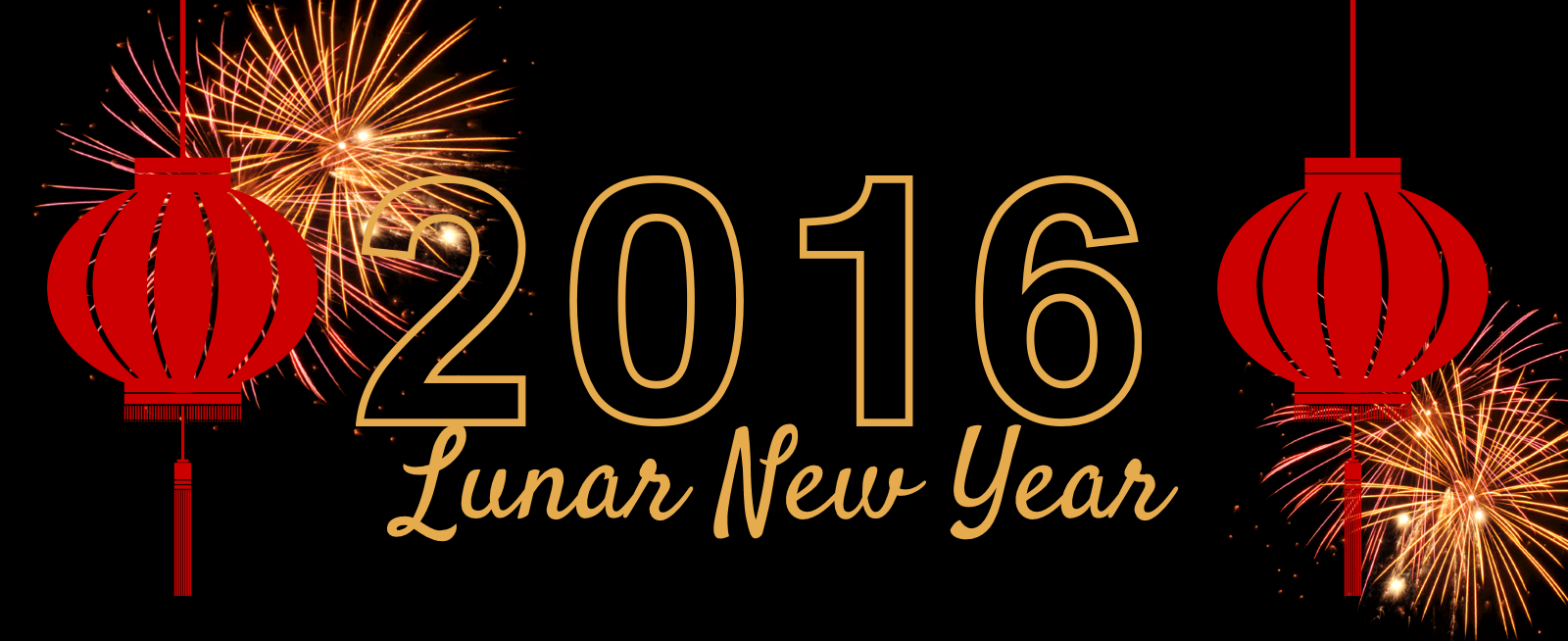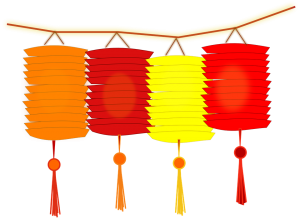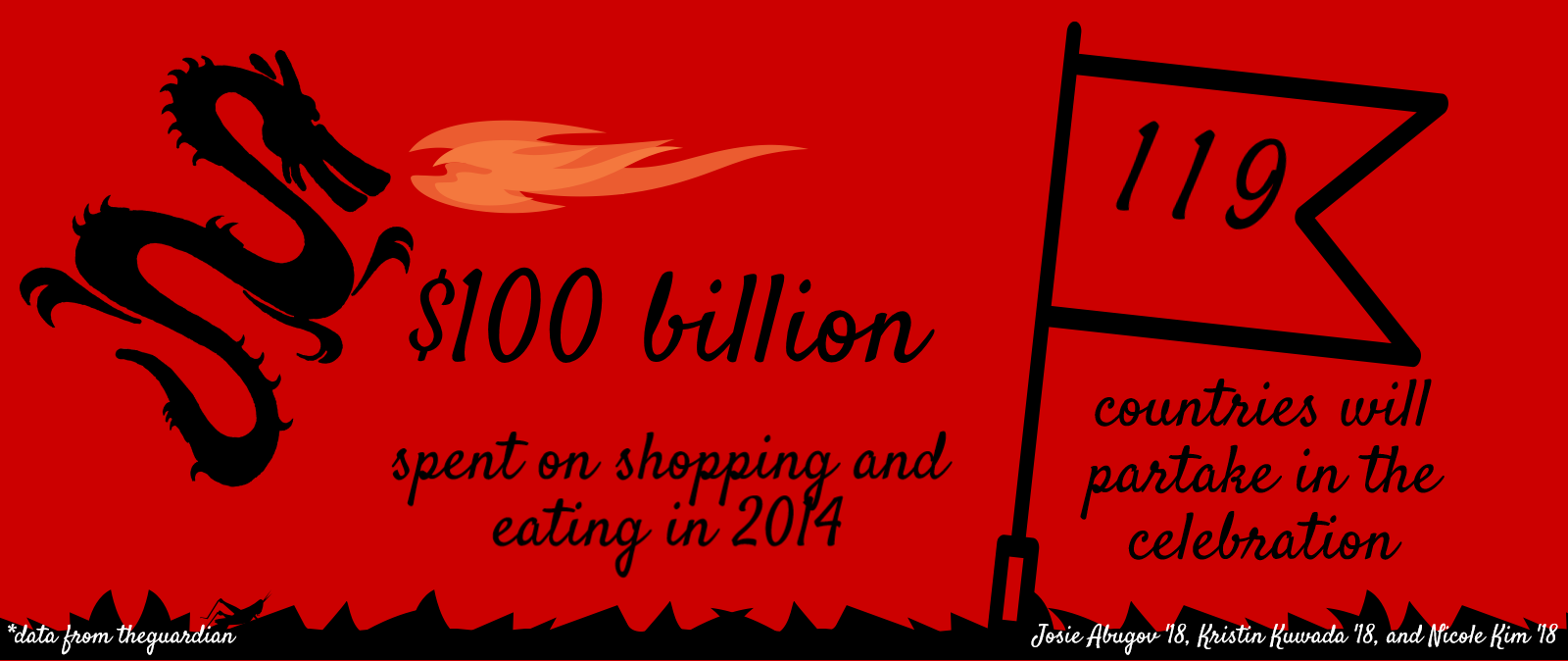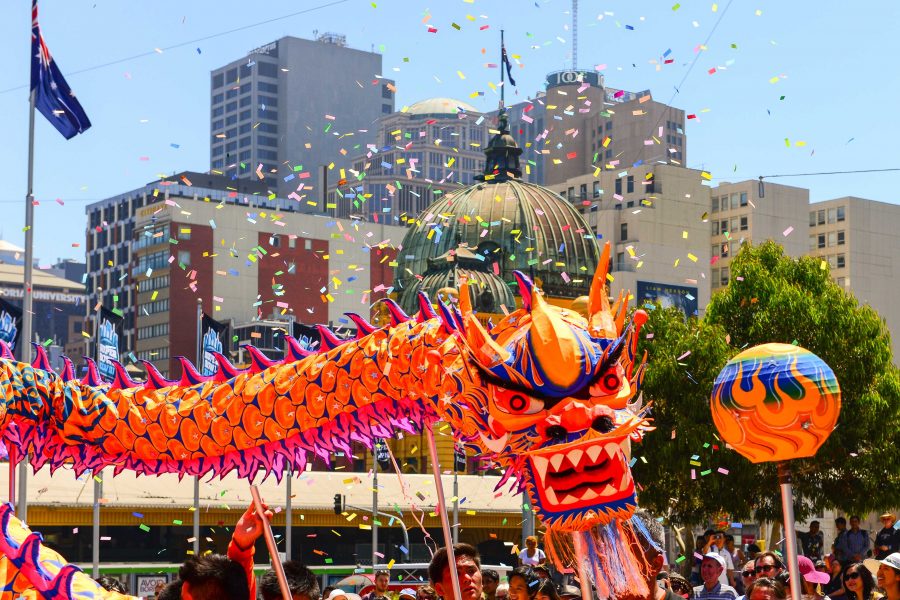
Like millions of others across the country, Anna Gong ’18 and her family had the television on for hours last weekend, but Chinese opera performers, lion dancers and dragon dancers in colorful costumes filled the screen instead of men in football gear and sports commentators.
Every year, festivities in China are broadcast on the eve of Chinese New Year. Also known as the Spring Festival, Chinese New Year is one of the most important Chinese festivals of the year, marking the new year in the traditional Chinese calendar. The new year always falls between Jan. 21 and Feb. 20 on the day of the new moon. This year, the new moon was Monday.
Keeping the television open to the Chinese channels is only one of many traditions that Gong and other students have. For those who celebrate, Chinese New Year is a time to honor and gather with family and welcome a prosperous year to come.
At the house of a family friend, Sara Zhao ’16 plays games with friends while the youngest of the children run around, the mothers gossip and the fathers drink, becoming more and more disoriented as time passes.
“All the lights in the house are on,” Zhao said. “If the house has a surround sound system, then usually Chinese music will be blaring.”
Zhao always celebrates Chinese New Year at a party with family and friends, some years as a host and other years as a guest.
“The party usually starts at six, and beforehand all the moms come in around four to make dumplings and prepare the food,” Zhao said. “Sometimes if my mom is in a good mood, she puts coins, like pennies or dimes, in some of the dumplings. Some people bring Chinese food from restaurants.”
When it comes time for the adults to give the children hong bao, Zhao makes sure to receive the red envelopes with money inside politely with two hands. Her father used to make her bow and show her gratitude to her elders before being handed the hong bao, but not anymore.
“We just got too old,” Zhao said.
At midnight, there are joyful exclamations and the sounds of glasses clinking.
When Zhao was younger, her parents would take her out, going from temple to temple to pray to the different Buddhist gods and light incense.
“Of course I was too young, so I did not really know what it meant,” Zhao said. “I just did the motions.”

Zhao said she would always eat stinky tofu with her family and look for the free packaged red candies somewhere around the temple with her brother.
“And then there was a gong that we hit sometimes,” she said.
At her house, her family puts a cutout of the upside-down Chinese character fu on the front door and hangs a lantern over the light as decoration.
“[My parents] told me that fu is supposed to mean fortune for your family,” Zhao said.
The same upside-down Chinese character in red is on the door at the Gong household next to fake firecrackers put up by Gong’s grandparents.
“The myth goes that there was a monster that was terrorizing villagers, and the color red scared him off, and also the sound of firecrackers,” Gong said.
When Gong attended third grade at a British-Chinese school in Shanghai, she lit firecrackers from midnight until two in the morning.
“That was my most traditional, ethnic Chinese experience of new year,” Gong said. “It sounded like shootouts everywhere.”
Festivities for the New Year in China go on for a week, Gong said.
“Everyone goes on break,” Gong said. “For migrant workers, we learned, it was the only time of year they had to go back to their families, so it was a really big deal.”
These days, Gong celebrates Chinese New Year with a family meal and Skype session with her relatives in China.
“Everyone gathers, and we talk about what we’ve done over the past year,” Gong said. “It is really meaningful since it is a kind of connection to where I am from. Every generation before me has lived solely in China, so I really enjoy connecting back to my parent’s country whenever I can.”
For the meal, her father and grandparents prepare an assortment of Chinese food like stir-fried vegetables, tofu strips with pickled vegetables and fried chicken wings. They are not foods traditionally eaten on Chinese New Year, but family favorites.
“It is not too special, but it feels good when everyone in the family is there and you have your favorite foods in front of you,” Gong said.
Before the New Year, Gong and her family clean the house, which makes up another of their traditions.
“We clean out the house before the New Year so that we welcome the good spirits and sweep out the bad ones,” Gong said. “It’s mostly just sweeping and vacuuming and mopping.”
William Chow ’17 celebrated Chinese New Year a week early this year and paid respects to his ancestors with prayer and incense.

Most years, his grandmother takes out a tray of ghost money and fake gold ingots and puts it all in a red metal basket. All the money is burned while the whole family watches. When the fire dies out, his grandmother begins to speak.
“Now all of our ancestors in heaven will have money to spend and be prosperous for the next year,” she says in Cantonese.
For Elizabeth Rao ’16, Chinese New Year means a lot of eating. The entire night or day before the New Year is spent making dumplings filled with pork and Chinese leek or fennel. Only a fraction of the dumplings are eaten the eve of the new moon, however, and none are usually eaten the next day.
“On the actual night of Chinese New Year, we are obligated to eat fish, chicken, pork, and beef, which are the four big meats,” Rao said. “We are also supposed to eat nian gao, sticky rice cakes.”
When her family eats the fish, they always make sure to leave some left over, so they never eat the tail or the head.
“We can use it to make porridge or some sort of soup the next day,” Rao said. “It is symbolic, so we always have to make sure that on New Year’s Day, we have this huge fortune, eat all this food and still have leftover food or fortune.”
The fish is always steamed. The pork is usually braised pork belly. The chicken dish is sometimes a curry or noodle soup, and the beef changes every year.
For Grace Pan ’16, who spends Chinese New Year eating dinner with her family and calling relatives in China, it is a time for her to remember where she came from.
“For my family anyways, it is the only kind of hallmark of Chinese culture, so it is nice to have that,” Pan said. “I like that it is a kind of cultural remembrance.”






























